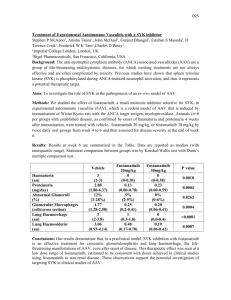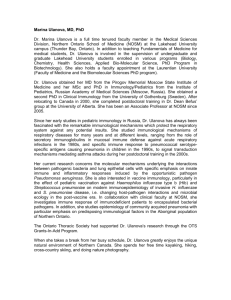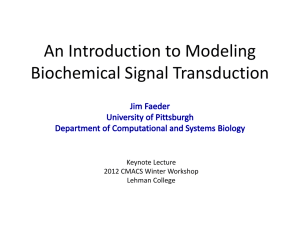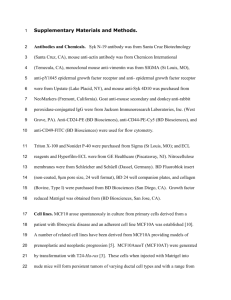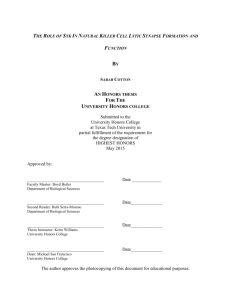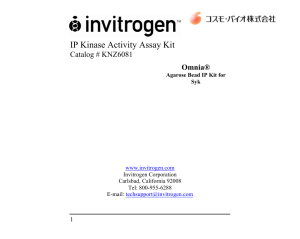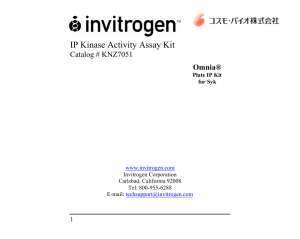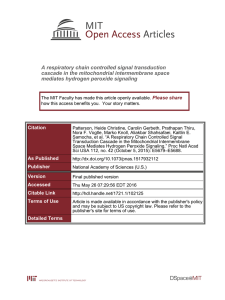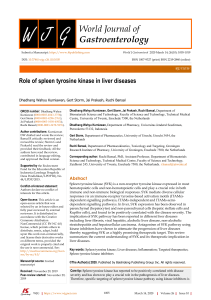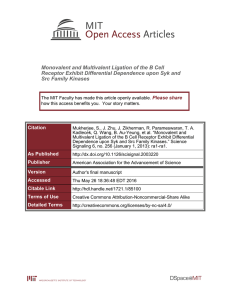SYK - A New Biomarker for Early Skin Cancer Detection... Early skin cancer diagnosis - an unmet need
advertisement
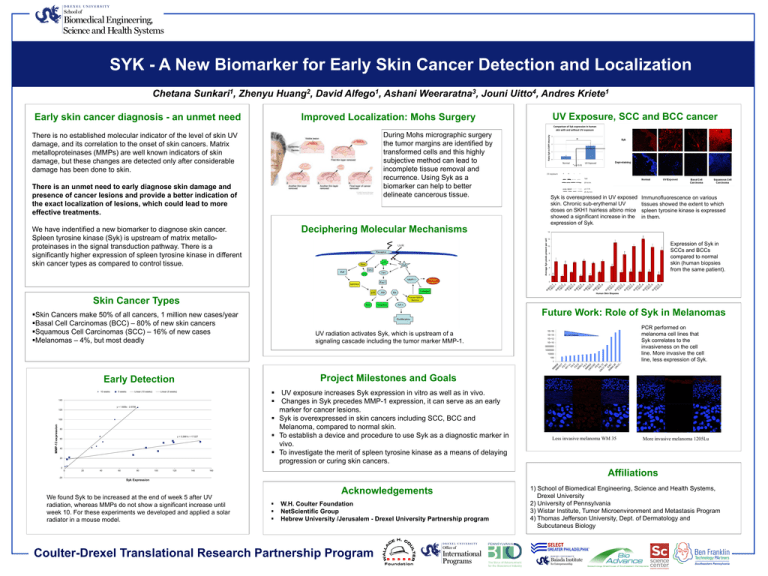
SYK - A New Biomarker for Early Skin Cancer Detection and Localization Chetana Sunkari1, Zhenyu Huang2, David Alfego1, Ashani Weeraratna3, Jouni Uitto4, Andres Kriete1 Early skin cancer diagnosis - an unmet need UV Exposure, SCC and BCC cancer Improved Localization: Mohs Surgery Comparison of Syk expression in human skin with and without UV exposure There is an unmet need to early diagnose skin damage and presence of cancer lesions and provide a better indication of the exact localization of lesions, which could lead to more effective treatments. Ratio Syk to DAPI Intensity During Mohs micrographic surgery the tumor margins are identified by transformed cells and this highly subjective method can lead to incomplete tissue removal and recurrence. Using Syk as a biomarker can help to better delineate cancerous tissue. There is no established molecular indicator of the level of skin UV damage, and its correlation to the onset of skin cancers. Matrix metalloproteinases (MMPs) are well known indicators of skin damage, but these changes are detected only after considerable damage has been done to skin. * 2 1 0 Normal * p < 0.01 UV Exposed Syk is overexpressed in UV exposed skin. Chronic sub-erythemal UV doses on SKH1 hairless albino mice showed a significant increase in the expression of Syk. Deciphering Molecular Mechanisms Immunofluorescence on various tissues showed the extent to which spleen tyrosine kinase is expressed in them. 14 Average Syk pixels present per cell We have indentified a new biomarker to diagnose skin cancer. Spleen tyrosine kinase (Syk) is upstream of matrix metalloproteinases in the signal transduction pathway. There is a significantly higher expression of spleen tyrosine kinase in different skin cancer types as compared to control tissue. 3 12 Expression of Syk in SCCs and BCCs compared to normal skin (human biopsies from the same patient). 10 8 6 4 2 0 Human Skin Biopsies Skin Cancer Types Future Work: Role of Syk in Melanomas Skin Cancers make 50% of all cancers, 1 million new cases/year Basal Cell Carcinomas (BCC) – 80% of new skin cancers Squamous Cell Carcinomas (SCC) – 16% of new cases Melanomas – 4%, but most deadly UV radiation activates Syk, which is upstream of a signaling cascade including the tumor marker MMP-1. PCR performed on melanoma cell lines that Syk correlates to the invasiveness on the cell line. More invasive the cell line, less expression of Syk. 1E+16 1E+14 Invasiveness 1E+12 1E+10 00000000 1000000 10000 100 1 Project Milestones and Goals Early Detection 10 weeks 5 weeks Linear (10 weeks) UV exposure increases Syk expression in vitro as well as in vivo. Changes in Syk precedes MMP-1 expression, it can serve as an early marker for cancer lesions. Syk is overexpressed in skin cancers including SCC, BCC and Melanoma, compared to normal skin. To establish a device and procedure to use Syk as a diagnostic marker in vivo. To investigate the merit of spleen tyrosine kinase as a means of delaying progression or curing skin cancers. Linear (5 weeks) 140 y = 1.609x - 2.5708 120 MMP-13 expression 100 80 y = 0.2681x + 17.027 60 40 20 0 0 -20 20 40 60 80 100 120 140 Less invasive melanoma WM 35 More invasive melanoma 1205Lu Affiliations 160 Syk Expression We found Syk to be increased at the end of week 5 after UV radiation, whereas MMPs do not show a significant increase until week 10. For these experiments we developed and applied a solar radiator in a mouse model. Acknowledgements W.H. Coulter Foundation NetScientific Group Hebrew University /Jerusalem - Drexel University Partnership program Coulter-Drexel Translational Research Partnership Program 1) School of Biomedical Engineering, Science and Health Systems, Drexel University 2) University of Pennsylvania 3) Wistar Institute, Tumor Microenvironment and Metastasis Program 4) Thomas Jefferson University, Dept. of Dermatology and Subcutaneus Biology
